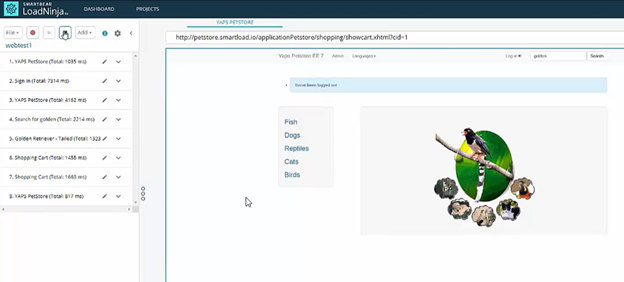Load testing assesses how a system, application, or website performs under specific conditions of concurrent user and data loads. The primary goal of load testing is to determine the system’s capacity and performance characteristics, such as response time, throughput, and resource utilization, under various levels of load.
Load testing is a crucial step in ensuring that your website or application can handle heavy traffic without performance issues. One tool that has obtained recognition in the field of load testing is Load Ninja. In this blog, we’ll take a closer look at Load Ninja, its features, and how it can help you ensure your software can stand up to the demands of real-world usage scenarios.
What is Load Ninja?
Load Ninja stands as a cloud-based platform dedicated to load and performance testing for web applications and web services. Load testing empowers developers, QA teams, and performance engineers to measure web server capacity under heavy loads, ensuring robustness and scalability.
Utilizing Load Ninja, the testing process becomes streamlined. Tests can be recorded effortlessly and then promptly replayed within a browser, all without the need for coding a single line. This efficiency can be attributed to two primary factors:
- Genuine Browser Interactions: The testing, replaying, and assessment occur within real browsers, replicating real-world scenarios accurately.
- Object-Level Recognition: The platform employs object-level recognition to identify recorded objects swiftly and accurately during playback, thereby expediting the process.
The flexibility of Load Ninja extends to the creation of both UI-based tests, imitate user interactions on the tested web application, as well as API tests that mirror a client’s interaction with the server through APIs.
Testing with Load Ninja

To assess your web server, you have the option to develop UI tests, API tests, or both, as outlined below:
- Creating UI or API Tests: These tests are designed to emulate the actions of a single user and replicate application usage procedures like making a purchase or browsing a product catalogue. A UI test simulates the interactions of a single user on the tested website, while an API test replicates the behavior of a client application. These tests are executed multiple times to replicate substantial loads on the web application being tested.
For UI tests, Load Ninja’s integrated browser facilitates test recording. By simply entering a URL, you can initiate the recording process.
API tests, on the other hand, require manual creation, involving the formulation of sequential requests.
- Developing a Load Testing Scenario: A scenario defines the parameters of your load test. It combines one or more single-user tests, specifies the number of virtual users (VU), outlines ramp-up load parameters, and other relevant details.
- Executing the Scenario: Load Ninja conducts load tests within a cloud environment and automatically allocates cloud resources for the test’s duration. In UI tests, each virtual user uses a real browser to meet test actions, interacting with the web app like actual users.
- Analyzing Results: Load Ninja generates a comprehensive report encompassing performance metrics collected throughout the test’s runtime. This data offers insights into server performance, aiding in the assessment of whether it aligns with the set service level agreement (SLA).
Why Use Load Ninja?
- Realistic Load Testing: Load Ninja enables the creation of lifelike load tests that replicate genuine user actions. Recording user interactions on the tested website and simulating them with many virtual users in load tests replicates real-world scenarios.
- Authentic Browser Simulation: Load Ninja utilizes actual browsers to play back recorded traffic. Each virtual user operates within its distinct browser environment, ensuring no interference between users.
- Cross-Platform Load Testing: It offers platform-independent load testing capabilities. You can generate and execute within a browser on any Internet-connected computer.
- Effortless Test Creation: Test creation is simplified and swift with Load Ninja. UI tests record user actions, while the integrated request editor creates API tests. The process requires no coding, downloads, or browser plugin installations.
- Testing Across Screen Resolutions: Modern web applications vary in appearance across devices and screen resolutions. Load Ninja emulates user activity across various devices and resolutions, aiding comprehensive load testing.
- Real-Time Monitoring of Virtual Users: Load Ninja establishes a connection to browsers simulating user actions, offering real-time visibility into browser windows.
Conclusion
Load Ninja is a powerful and user-friendly tool that simplifies the process of assessing your application’s performance under heavy loads. Load Ninja offers scriptless testing, real browser simulation, scalability, and detailed reporting, a valuable tool for developers, testers, and performance engineers.


Thank you for sharing good information.